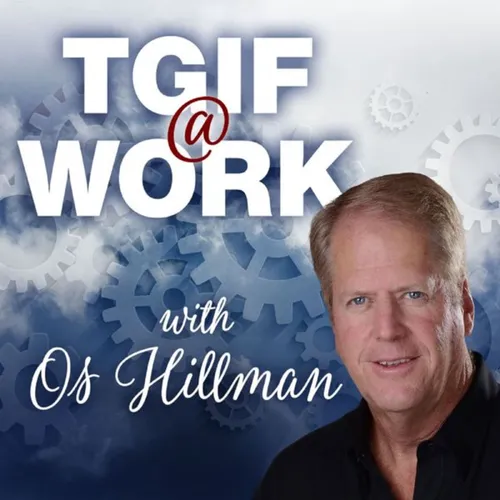Marketplace Lessons from Moses (and how to avoid his mistakes)
- Author
- Nicole
- Published
- Tue 31 Dec 2019
- Episode Link
- https://oshillman.audioacrobat.com/deluge/oshillman-20191231091029-4142.mp3
What does Moses have to do with my marketplace call? Can I learn anything from this leader to apply to my own daily work life call? Stay tuned and we'll find out. How do I bring my faith to work? How do I tap into the power of God in my work life call? Why am I going through this adversity? It's got mad at me. I'm Os Hillman and I've been helping leaders like you enter these questions and for, for over 30 years, that's what this podcast is all about. Let's learn and grow together. Welcome to GIF. Today. God is first.
Hey guys, this week I'm in North Myrtle beach. Every year I come down here between the December 26 and January 1st and I like to do a lot of my writing and just to decompress down here. Also have a very close friend of mine, Jim, who is 83 years old today. Not today, but, this year. He has been a mentor and father to me. He's been a pastor for over 32 years here in this area. And if I was to point the camera down that way, you would see a pier. And that is the peer that I accepted Christ on in 1975 at 11:00 PM one night. And so this place has a special place for me, a place in my heart for me this week. I want to talk to you about the marketplace principles we can learn from the life of Moses. And whenever I think about the ocean, I think about Moses and the red sea.
Moses has a lot of things that you and I can learn from what he did. And you know, he represents a type of leader that made a lot of mistakes. You know, the first mistake he made was when he realized who he was and that God in some way wanted to use him in a very powerful way to deliver a people from slavery. He went about it the wrong way. He used his power and, uh, to try to force things to happen. And we know that he killed an Egyptian. And that led him to have to flee after being raised in the ways of Egypt and no doubt that impacted him and not really understanding how to be led by God or be used by God in such a way. And so, you know, Moses is a, a type of marketplace person where we can sometimes use our force to make things happen, but God, you know, has to take us through a process.
And so God’s process for Moses was to take him into the desert and put him out there as a shepherd. And, you know, the shepherd life was something the Egyptians despised. It was the lowliest of all professions. And, uh, you know, when I think about Moses and when God, after 40 years, decides to reengage him through the burning Bush, and that when he sees this burning over to the side during his work day, I think that's interesting that he does it during his work day. And so God speaks to him. And the first thing he says to him, it says, Moses, take off your shoes for a year on Holy ground. Now what does that mean? Well, you know, even our daily work life, God says that it's Holy ground because my presence is there. And that's another principle we need to understand is that God sometimes comes to us in the day to day activities like our life.
And he wants us to really experience his presence even in that place. And so after the initial discussion with Moses, God asked him a very interesting question and he says, Moses, uh, what is that in your hand? Of course, Moses said, well, it's my staff Lord. I picked up this stick here on the beach and uh, it'll just be our staff for a minute. Okay. And, uh, so he says, Moses lay down that staff. And so he lays out the staff and it turns into a snake and a imagine the shock. And so then God, Elsa and that pickup, that snake by the tail and alive was that important. Whether it was important because he was taking a car to you over the serpent, which is represented as the devil and the scriptures that caused the, uh, problems with he back in the garden of Eden.
And so Moses is taking authority over that. So he picks it up by the tail. And when he does, it turns back into a staff. Now. Then God says something very interesting in the scriptures from that point on. He says, now take that staff and perform m
